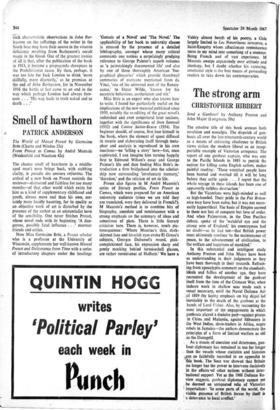Smell of hawthorn
-r PATRICK ANDERSON The chance smell of hawthorn in a middle- aged man's nose brings back, with stabbing clarity, le paradis des amours enfantins. The arrival of a new book on Proust reminds the reviewer—distracted and faithless for too many months—of that other world which exists for him as a kind of supplementary childhood and youth, almost more real than his own, cer- tainly more lucidly haunting, for its quality as an objective work of art is disturbed by the presence of the author as an existentialist hero of the sensibility. One never finishes Proust, whose novel ends with its beginning. 'A dan- gerous, possibly fatal influence . . .' murmur friends and critics.
Now Miss Germaine Bret, a Proust scholar who is a professor at the University of Wisconsin, supplements her well-known Marcel Proust and Deliverance from Time with a series of introductory chapters under the headings From Proust to Camus by Andre Maurois (Weidenfeld and Nicolson 42s) `Genesis of a Novel' and 'The Novel.' The applicability of her book to university classes is stressed by the presence of a detailed bibliography, amongst whose many critical comments one notices a surprisingly grudging reference to George Painter's superb volumes as 'a painstakingly documented life' and also by one of those thoroughly American 'bio- graphical glossaries' which provide thumbnail summaries of everyone mentioned from da Vinci, 'one of the universal men of the Renais- sance,' to Oscar Wilde, 'known for his eccentric behaviour, aestheticism and wit.'
Miss Bree is an expert who also knows how to write. I found her particularly useful on the implications of the new material published since 1950, notably the re-editing of the great novel's unfinished and even conjectural later sections, together with the significance of Jean Santeuil (1952) and Contre Sainte-Beuve (1954). The beginner should, of course, first lose himself in the book, where the element of quest diffused in reverie and elaborating itself through meta- phor and analysis is reproduced in his own reactions—no 'telling a story' here—but, once captivated, I can imagine him turning happily first to Edmund Wilson's essay and George Painter's life and then finding Miss Bree's in- troduction a firm bridgehead into the scholar- ship now surrounding 'involuntary memory,' 'duration,' and the relation of art to life.
Proust also figures in M Andre Maurois's series of literary profiles, From Proust to Camus, which were prepared for an American university audience (since we are told they are translated, were they delivered in French?). M Maurois's method is to combine bits of biography, anecdote and reminiscence with a strong emphasis on the summary of ideas and sometimes of plots. There is little literary criticism here. There is, however, much pic- turesqueness: 'Where Mauriac's thin, dark- skinned face and feverish eyes evoke El Greco's subjects, Georges Duhamel's round, pink- complexioned face, his expression sharp and gently mocking behind tortoiseshell glasses, are rather reminiscent of Holbein.' We have a Valery almost bereft of his poetry, a Gide largely limited to Les Nourritures terrestres, a Saint-Exupdry whom affectionate reminiscence turns to my naind into something of a monster. Being French and of vast experience, M Maurois sweeps expansively over attitude and ideology, but I doubt whether his caressing, emotional style is the best means of persuading readers to take down his contemporaries.


































 Previous page
Previous page